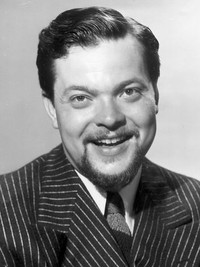Orson Welles

An undeniable pioneer in both radio and film, actor-director Orson Welles used his bona fide genius to change the face of both mediums with imagination, ambition, and technically daring. Having started off as a performer on stage, most notably with John Houseman, with whom he formed the famed Mercury Theatre, Welles used his distinctive baritone voice to create innovative radio dramas. He became famous - notorious, even - following his 1938 broadcast of H.G. Wells' "War of the Worlds," which he presented as a real time news event, sparking panic among listeners who thought Martians really were invading New Jersey. The fame he achieved in the wake of the broadcast attracted RKO Pictures, where he made the most stunning directorial debut in the history of cinema with "Citizen Kane" (1941), long considered to be the greatest film ever made. Using innovative narrative and technological techniques, Welles singlehandedly changed the face of cinema, earning the nickname the Boy Wonder. He went on to direct "The Magnificent Ambersons" (1942), though both films were financial failures that prompted his exit from RKO. After marrying Love Goddess Rita Hayworth and directing "The Stranger" (1946) and "Macbeth" (1948), Welles began a 10-year self-imposed Hollywood exile that saw him appear onscreen in movies like "The Third Man" (1949) while directing well-received films overseas like "Othello" (1952) and "Mr. Arkadin" (1955). He returned to Hollywood to helm "Touch of Evil" (1958), a classic film noir, while suffering a commercial drubbing with his adaptation of Franz Kafka's "The Trial" (1962). His take on Shakespeare's famed character, Falstaff, in "Chimes at Midnight" (1966) again earned international acclaim despite being largely ignored in the United States. Though he fell on hard times in the 1970s, Welles nonetheless remained busy with numerous projects in various stages of completion while appearing onscreen in a number of performances and using his distinctive voice in a variety of narrator roles. When he died in 1985, Welles left behind a legacy as a consummate artist and true auteur whose influence was profoundly felt by several generations of filmmakers.